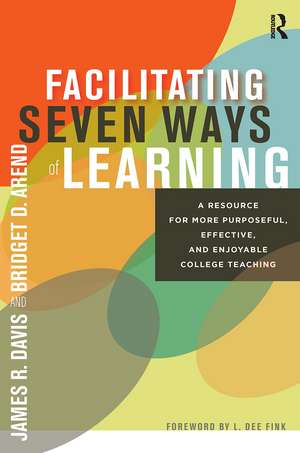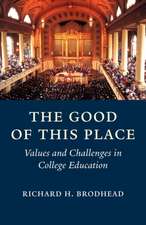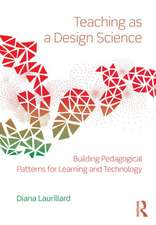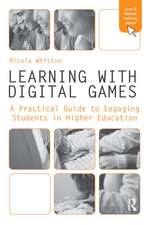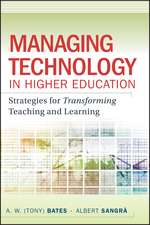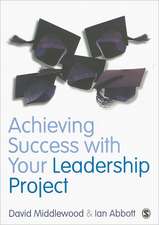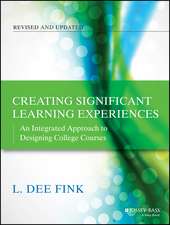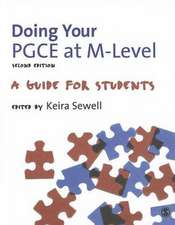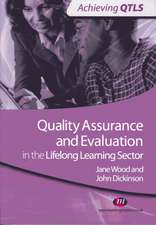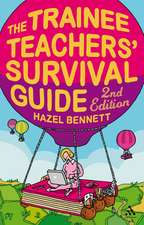Facilitating Seven Ways of Learning: A Resource for More Purposeful, Effective, and Enjoyable College Teaching
Autor James R. Davis, Bridget D. Arenden Limba Engleză Paperback – 16 oct 2012
| Toate formatele și edițiile | Preț | Express |
|---|---|---|
| Paperback (1) | 284.56 lei 43-57 zile | |
| Taylor & Francis – 16 oct 2012 | 284.56 lei 43-57 zile | |
| Hardback (1) | 1008.97 lei 43-57 zile | |
| Taylor & Francis – 16 oct 2012 | 1008.97 lei 43-57 zile |
Preț: 284.56 lei
Nou
Puncte Express: 427
Preț estimativ în valută:
54.45€ • 56.99$ • 45.32£
54.45€ • 56.99$ • 45.32£
Carte tipărită la comandă
Livrare economică 31 martie-14 aprilie
Preluare comenzi: 021 569.72.76
Specificații
ISBN-13: 9781579228415
ISBN-10: 1579228410
Pagini: 326
Dimensiuni: 152 x 229 x 23 mm
Greutate: 0.45 kg
Ediția:1
Editura: Taylor & Francis
Colecția Routledge
Locul publicării:Oxford, United Kingdom
ISBN-10: 1579228410
Pagini: 326
Dimensiuni: 152 x 229 x 23 mm
Greutate: 0.45 kg
Ediția:1
Editura: Taylor & Francis
Colecția Routledge
Locul publicării:Oxford, United Kingdom
Public țintă
Postgraduate and Professional Practice & DevelopmentCuprins
Foreword L. Dee Fink Preface Part One. Understanding Teaching and Learning 1. The Lecture Paradigm and the New Context of Teaching and Learning 2. Alternative Approaches to Teaching and Learning 3. Using the Seven Ways of Learning for Teaching Part Two. Organizing Teaching and Learning 4. Building Skills. Behavioral Learning 5. Acquiring Knowledge. Cognitive Learning 6. Developing Critical, Creative, and Dialogical Thinking. Learning Through Inquiry 7. Cultivating Problem Solving and Decision Making. Learning With Mental Models 8. Exploring Attitudes, Feelings, and Perspectives. Learning Through Groups and Teams 9. Practicing Professional Judgment. Learning Through Virtual Realities 10. Reflecting on Experience. Experiential Learning Part Three. Transforming College Teaching 11. More Purposeful, Effective, and Enjoyable Teaching About the Authors Index
Notă biografică
James R. Davis is the Dean of University College, the college for professional and continuing education at the University of Denver. He is the author of Better Teaching, More Learning: Strategies for Success in Postsecondary Settings (Oryx Press, 1993) and (with his wife Adelaide) Effective Training Strategies: A Comprehensive Guide to Maximizing Learning in Organizations (Berrett-Koehler, 1998). Bridget D. Arend is Director of University Teaching at the University of Denver’s Office of Teaching and Learning. Her work puts her into direct contact daily with faculty who want to reflect on their teaching, giving her first-hand knowledge of what college teachers think about and struggle with today. She teaches adult learning and educational technology courses for the Morgridge College of Education and University College at the University of Denver and uses the seven ways of learning in her own teaching, in her faculty development work, and in one-on-one consultations and workshops. L. Dee Fink
Recenzii
"“Slam dunk, touchdown, goal, grand slam, ace!!! This book is fabulous. Davis and Arend have pulled together an exceptional resource for better understanding effective teaching strategies by demonstrating how to adjust teaching based on what students need to learn. As faculty, we expect students to learn a wide variety of concepts, processes, and applications. To accomplish this, research clearly suggests using a variety of strategies. This book not only explains that research, but also gives concrete examples and a solid rationale for each learning approach.
While the authors note this material is not intended for those brand new to teaching, and although I believe just about anyone teaching at the postsecondary level could learn from this book, the primary audience really is faculty who are looking to rethink what they are currently doing. This book will result in seriously reassessing how to best facilitate learning.
This is the perfect book for groups and reading circles of experienced teachers. I will certainly add to my faculty development collection.”
Todd Zakrajsek, Associate Professor, School of Medicine, University of North Carolina at Chapel Hill
"The seven ways of learning identified by Davis and Arend will add a great deal of precision to the task of selecting the right set of learning activities for a rich, or in my language, significant set of learning goals.
Another feature of this book that adds major value is the fact that the authors clearly understand the important relationships in learning-centered, integrated course design. Therefore for each of the seven ways of learning, i.e., the seven sets of learning activities, they comment on the learning goals and the assessment activities that are appropriate for that way of learning.
For those of us who care about our students’ learning – and I believe that is the attitude of the majority of teachers – this book offers valuable strategies for improving learning, and will be worth reading for years to come!"
L. Dee Fink
"In a crowded marketplace of snake oil cure-alls for Higher Education comes this refreshingly straight-forward, sensible, and practical guide for college teachers. As Davis and Arend point out, learning is not just one thing, but many. Learning a skill is different from learning information, which is different form learning to think critically or creatively. It follows that there cannot be one way to teach it all. With careful attention to the research about multiple types of learning, Davis and Arend have provided a treasure trove of tips and techniques, from low-tech engaging discussions to high-tech virtual reality simulations, to help college teachers create learning environments that work."
Michael Wesch, 2008 US Professor of the Year, University Distinguished Teaching Scholar, Kansas State University
"When I saw the first drafts of this book I wanted to reach out and applaud. It is particularly welcome to find a volume that encourages us to slough off past habits and look to the students' learning. It's not easy; it's not comfortable and at times it feels anything but secure, but the students gain by it and even enjoy learning. Davis and Arend's book has much to offer the international reader, as well as the American one. Although soundly based on theory, this book is a practical primer for university teachers anywhere and everywhere."
C. Bland Tomkinson,FHEA FAUA, Honorary Visiting Pedagogic Development Adviser, Faculty of EPS, Visiting Lecturer, School of MACE, University of Manchester
While the authors note this material is not intended for those brand new to teaching, and although I believe just about anyone teaching at the postsecondary level could learn from this book, the primary audience really is faculty who are looking to rethink what they are currently doing. This book will result in seriously reassessing how to best facilitate learning.
This is the perfect book for groups and reading circles of experienced teachers. I will certainly add to my faculty development collection.”
Todd Zakrajsek, Associate Professor, School of Medicine, University of North Carolina at Chapel Hill
"The seven ways of learning identified by Davis and Arend will add a great deal of precision to the task of selecting the right set of learning activities for a rich, or in my language, significant set of learning goals.
Another feature of this book that adds major value is the fact that the authors clearly understand the important relationships in learning-centered, integrated course design. Therefore for each of the seven ways of learning, i.e., the seven sets of learning activities, they comment on the learning goals and the assessment activities that are appropriate for that way of learning.
For those of us who care about our students’ learning – and I believe that is the attitude of the majority of teachers – this book offers valuable strategies for improving learning, and will be worth reading for years to come!"
L. Dee Fink
"In a crowded marketplace of snake oil cure-alls for Higher Education comes this refreshingly straight-forward, sensible, and practical guide for college teachers. As Davis and Arend point out, learning is not just one thing, but many. Learning a skill is different from learning information, which is different form learning to think critically or creatively. It follows that there cannot be one way to teach it all. With careful attention to the research about multiple types of learning, Davis and Arend have provided a treasure trove of tips and techniques, from low-tech engaging discussions to high-tech virtual reality simulations, to help college teachers create learning environments that work."
Michael Wesch, 2008 US Professor of the Year, University Distinguished Teaching Scholar, Kansas State University
"When I saw the first drafts of this book I wanted to reach out and applaud. It is particularly welcome to find a volume that encourages us to slough off past habits and look to the students' learning. It's not easy; it's not comfortable and at times it feels anything but secure, but the students gain by it and even enjoy learning. Davis and Arend's book has much to offer the international reader, as well as the American one. Although soundly based on theory, this book is a practical primer for university teachers anywhere and everywhere."
C. Bland Tomkinson,FHEA FAUA, Honorary Visiting Pedagogic Development Adviser, Faculty of EPS, Visiting Lecturer, School of MACE, University of Manchester
Descriere
For teachers in higher education who haven’t been able to catch up with developments in teaching and learning, James Davis and Bridget Arend offer an introduction that focuses on seven coherent and proven evidence-based strategies.
